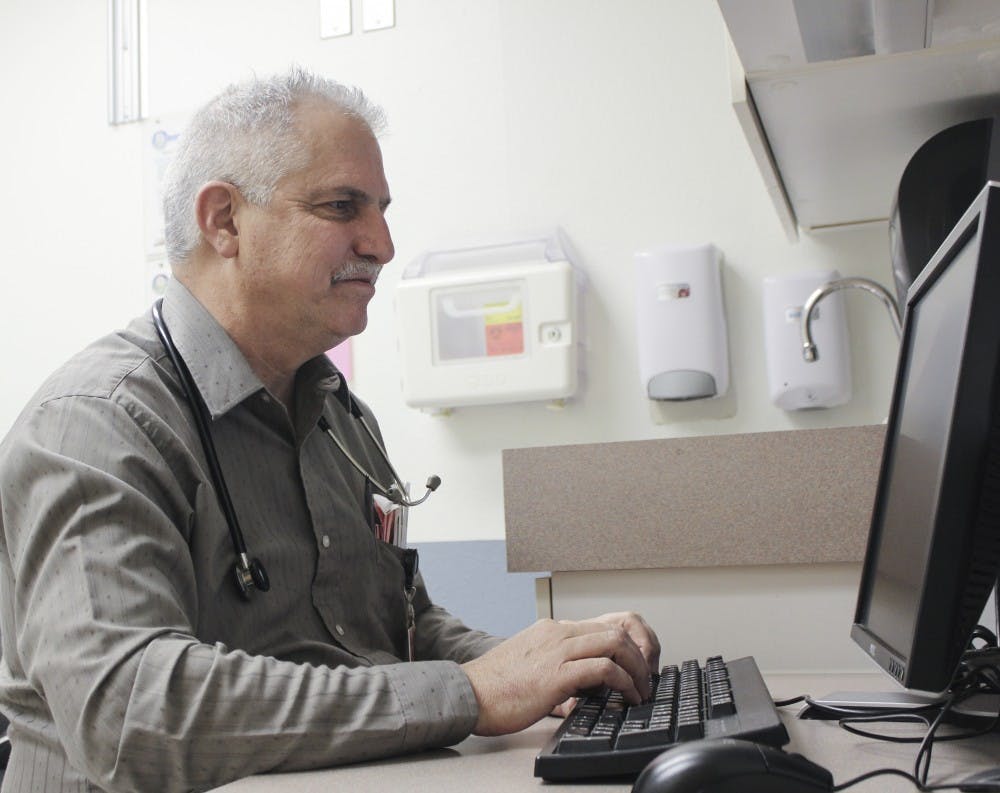Dr. Randall Knott, assistant pediatrics professor at UNM, said there is yet to be a reported case of measles in New Mexico, but the national average is currently at 170 cases, approaching a record high in recent decades.
This is concerning, he said, considering that just four years ago the United States was at a record low.
“It’s a disease that’s existed for thousands of years, and we had accomplished fantastic results from all the success we’ve had with vaccinating children,” he said. “That just goes to show how really fantastic the vaccine is.”
But it’s not quite as simple as that, he said.
“It’s emerged as a growing concern because of choices that parents have arrived at, in terms of choosing not to vaccinate their children,” he said.
Many reasons parents choose to not vaccinate their children stem from misinformation presented on the internet and other media, rather than general ignorance on their part, he said.
“We know that it’s usually the very educated parents (who choose not to vaccinate). You would think that would not be the case,” Knott said. “There’s a lot of information out there that they investigate and they tease out that they pay attention to, which unfortunately is not the kind of research and investigation that we feel is the accurate information.”
Much of the concern stems from the belief that the MMR vaccine causes autism, a belief that has spread and is accepted as truthful by many families, he said. The majority of that misinformation comes from an article published in The Lancet journal almost 20 years ago by a G.I. physician named Andrew Wakefield.
“It was published in The Lancet — which was a very big misfortune — where he alleged that the MMR was linked to autism. So that’s the great concern that people have, that has been shown to be a very faulty piece of ‘research.’ You can’t even use that word with what he did,” Knott said. “The inertia from that still lives. There are countries in Africa that have better vaccination rates than some of the countries in Europe, for example.”
There were numerous problems with Wakefield’s research, Knott said. Among them is the fact that the study was largely funded by lawyers and was very small in scope, being conducted on only about a dozen patients, he said.
Everybody involved went on to retract their statements except for Wakefield himself, who lost his license to practice medicine altogether after the incident, he said. The Lancet journal also retracted the faulty article and issued an apology for even running it in the first place.
Get content from The Daily Lobo delivered to your inbox
Even in light of the recent measles outbreak, Wakefield continues to defend his findings. In a February interview in Newsweek, he said he still believes that the MMR vaccine causes autism.
“The responsibility lies squarely on the shoulders of those that have been involved in vaccine policymaking, which is totally inadequate and bordering on dangerous,” Wakefield said in the interview. “The government has only themselves to blame for this problem.”
That hasn’t stopped the false information from spreading, however, with many parents writing off vaccination as harmful or unnecessary, Knott said.
Measles is probably one of the most contagious and dangerous viruses that exists, due to the high level of protection necessary to combat the disease, he said. It is one of the very few germs that is truly airborne and it can cause severe complications, including brain problems, pneumonia and ear infections.
Before the vaccine was created in the 1930s, there were around 750,000 cases of measles every year, he said. Measles accounted for around 145,700 deaths worldwide in 2013, according to the World Health Organization.
The MMR vaccine is administered to children only twice for a lifetime of protection, he said. The first vaccination is done when the child is about one year old and then a second time when they are around four to six years of age.
In almost all cases, those who contract measles have not been previously vaccinated, Knott said. With the close proximity of children in schools, for example, a virus as contagious as measles can be extremely dangerous and without vaccination, the situation can escalate quickly.
“We all have to contribute to a better community. Every time someone chooses not to vaccinate their child, they are not contributing to helping make for a better, safer community to help protect those who are most vulnerable. Every bit of credible medical science that has looked at this over the last decade or two, has come to the conclusion that vaccines do not cause autism,” Knott said. “So please, please, please, listen to and investigate the science that has good, firm foundations in appropriately performed research.”
A pediatrician at UNMH for 25 years, Knott previously spent five years doing private practice in Santa Fe, where he encountered a lot of concerns regarding the MMR vaccine from worried parents.
He said he knows that getting the correct knowledge out is crucial to his job and the health of future generations.
“It’s a wonderful career to be in, working with children and to be working with parents and have a partnership with trying to help keep children safe,” he said.
Matthew Reisen is a staff reporter at the Daily Lobo. He can be contacted at news@dailylobo.com or on Twitter @DailyLobo.






